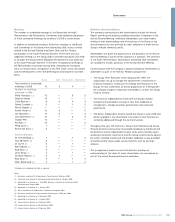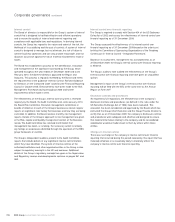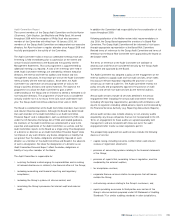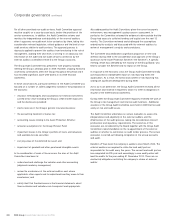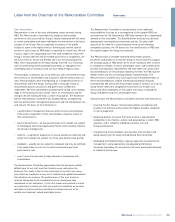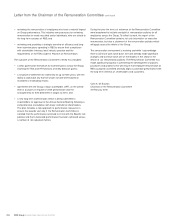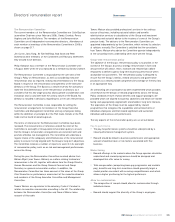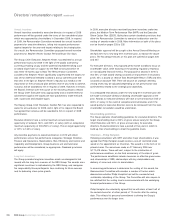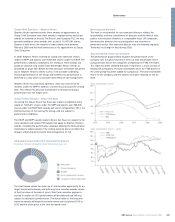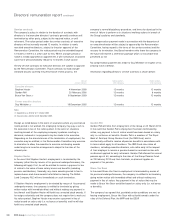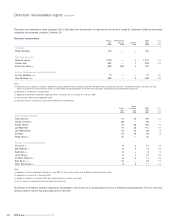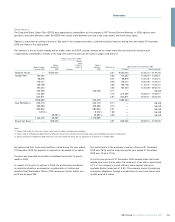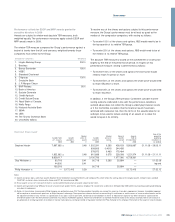RBS 2009 Annual Report Download - page 227
Download and view the complete annual report
Please find page 227 of the 2009 RBS annual report below. You can navigate through the pages in the report by either clicking on the pages listed below, or by using the keyword search tool below to find specific information within the annual report.
225RBS Group Annual Report and Accounts 2009
Directors’ remuneration report
The Remuneration Committee
The current members of the Remuneration Committee are Colin Buchan
(committee Chairman since February 2009), Sandy Crombie, Penny
Hughes and John McFarlane. The members of the Remuneration
Committee are all independent non-executive directors. Attendance of
each member at meetings of the Remuneration Committee in 2009 is
shown on page 217.
Jim Currie, Janis Kong, Sir Tom McKillop, Bob Scott and Peter
Sutherland were members of the Committee until February 2009 when
they ceased to be directors.
Philip Hampton was a member of the Remuneration Committee until
4 August 2009, when he was replaced as a member by Sandy Crombie.
The Remuneration Committee is responsible for the overview of the
Group’s Policy on Remuneration, as well as considering executive
remuneration and, as required, making recommendations to the Group
Board in respect of the remuneration arrangements of the executive
directors of the Group. The Board as a whole reserves the authority to
make the final determination of the remuneration of directors as it
considers that this two-stage process allows greater consideration and
evaluation and is consistent with the unitary nature of the Board. No
director is included in decisions regarding his or her own remuneration.
The Remuneration Committee is also responsible for setting the
remuneration arrangements for members of the Group Executive
Committee and Management Committee and any employees falling
within the definition of principle 8 of the FSA Code. Details of the FSA
Code can be found at www.fsa.gov.uk.
The terms of reference for the Remuneration Committee have been
reviewed. The revised terms of reference extend the remit of the
Committee to oversight of Group-wide remuneration policy to ensure
that the Group’s remuneration arrangements are consistent with and
promote effective risk management. The Committee will undertake a
regular review of the adequacy and effectiveness of the remuneration
policy to ensure it is fully aligned with the Group’s long-term objectives.
The Committee receives a number of reports to assist it in its oversight
of remuneration policy, such as on risk and management performance
across the Group.
During the year, the Remuneration Committee received advice from
Watson Wyatt (now Towers Watson) on matters relating to directors’
remuneration in the UK, together with advice from the Group Director,
Human Resources and the Group General Counsel and Group
Secretary on general remuneration matters. In addition, the
Remuneration Committee has taken account of the views of the Group
Chief Executive on performance assessment of the executive directors
and members of the Group Executive Committee and Management
Committee.
Towers Watson are signatories to the voluntary Code of Conduct in
relation to executive remuneration consulting in the UK. The relationship
between the Remuneration Committee and Towers Watson takes
account of this code.
Towers Watson also provided professional services in the ordinary
course of business, including actuarial advice and benefits
administration services to subsidiaries of the Group and investment
consulting and actuarial advice to the trustees of some of the Group’s
pension funds. The advisers to the Remuneration Committee are
appointed independently by the Committee, which reviews its selection
of advisers annually. The Committee is satisfied that the consultants
from Towers Watson who advise the Committee operate independently
of the consulting teams undertaking other work with the Group.
Group-wide remuneration policy
The objective of the Group’s remuneration policy is to provide, in the
context of the Group’s business strategy, remuneration in form and
amount which will attract, retain, motivate and reward high calibre
employees to deliver superior long-term business performance within
acceptable risk parameters. The remuneration policy is designed to
ensure that the Group’s metrics, reward structures and governance
processes as a whole provide comprehensive coverage of the key risks
in an appropriate way.
An overarching set of principles has been implemented which provides
a framework for the design of reward programmes across the Group.
Policy standards ensure reward, benefits and support packages are
provided which are aligned to business objectives and which are market
facing and appropriately aligned with shareholders’ long term interests.
The aspirations of the Group must be supported by reward
programmes that recognise the capabilities and achievements of
individual employees and that reward significant and sustained
individual and business unit performance.
The key aspects of the remuneration policy are as set out below:
Pay-for-performance
•The pay-for-performance systems should be underpinned by a
robust performance management system.
•Reward should be linked to business performance and appropriate
account should be taken of risk factors associated with that
business.
Market facing
•Reward offerings in the markets where the Group operates should be
understood and reward programmes should be designed and
developed that offer value for money.
•Total compensation (comprising base pay progression and variable
pay), benefits and long-term incentives should generally target a
market position consistent with ensuring competitiveness and which
allows a higher positioning for the highest performers.
Allow for customisation
•The composition of reward should allow for customisation through
individual choice.
•Reward should support the diversity of the Group’s employees.
Governance




